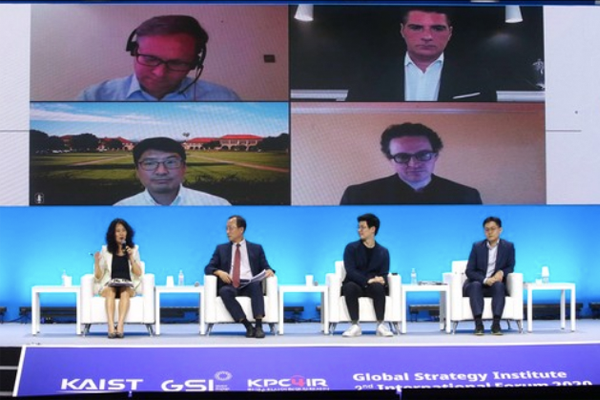KPC4IR (Korea Policy Center for the 4th Industrial Revolution) together with GSI (Global Strategy Institute) hosted the Second GSI International Forum on challenges for educational innovation in the non-contact society in the post-coronavirus era. Live-streamed on Youtube, Naver TV, and KTV on June 24, 2020, the Forum gathered 15 global experts and advisors of educational issues to examine significant challenges for the future of education in an increasingly non-contact society and envision inclusive educational innovations in the post-COVID-19 era.
According to UNESCO and UNICEF, 1.6 billion students from 192 countries, which account for 91 percent of the student population in the world, have experienced educational disruptions due to COVID-19 in the past months. Approximately 29 percent of youth worldwide, around 346 million individuals, have difficulty accessing online education due to a widening digital divide.
KAIST President Sung-Chul Shin’s opening remarks stressed that technological breakthroughs should be used to benefit all, and the private and public sectors should collaborate to facilitate an inclusive educational environment.
Minerva School’s CEO, Ben Nelson, and Coursera CEO, Jeff Maggioncalda were among the eminent speakers who shared their insights on the new transformations at higher education institutions.
Dr. Paul Kim, CTO, Assistant Dean of Stanford Graduate School of Education, introduced the field experience of online education and suggested an educational model. He also described the gaps between developed countries and developing regions in implementing education platforms.
Phil Baty, CEO of Times Higher Education, presented the findings of THE’s Global University Leaders’ Survey of more than 200 university presidents and vice-chancellors, examining their responses to the COVID-19 pandemic and its longer-term implications for global higher education and research.
As for innovation in higher education, Vice President at Microsoft Anthony Salcito and Professor Tae Eog Lee of the Department of Industrial and Systems Engineering at KAIST discussed various solutions of education innovation they have worked on and the future plans for further expansion.
The second session was looked at issues of digital inequity. Director General at the Ministry of Science and ICT, Sang Wook Kang, explained the inevitable online transition accompanying the educational disruptions due to COVID-19. He shared his ideas on how this crisis could be leveraged to advance the educational environment.
The moderator of the Forum, So Young Kim, who is also the director of the KPC4IR, commented that “KAIST has been the forerunner in the educational innovation. She added that “education is fundamentally about change for the better – whether for individuals or societies. If we want to build back better from the current pandemic paralysis, there is no doubt that we should begin with the problems of education affecting all of us as teachers, students, parents, or citizens. The Forum would be a valuable resource and opportunity for all of us keen to improve the state of education and imagine a better education for the future of humanity.”

Korea Policy Center for the Fourth Industrial Revolution (KPC4IR), KAIST
Homepage: https://kpc4ir.kaist.ac.kr/
E-mail: hdrha@kaist.ac.kr






